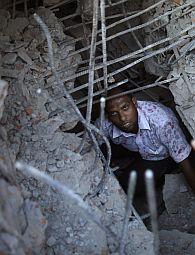 | « Back to article | Print this article |
 The death toll in Bangladesh's worst industrial disaster on Sunday rose to 1,125 after 15 more decomposed bodies were recovered from the debris of the ill-fated eight-storey building, 19 days after the tragedy.
The death toll in Bangladesh's worst industrial disaster on Sunday rose to 1,125 after 15 more decomposed bodies were recovered from the debris of the ill-fated eight-storey building, 19 days after the tragedy.
Rain has caused delays in recovery operations as overnight rainstorms forced rescuers to suspend work for several hours, and more rain on Sunday morning caused a brief delay. By afternoon, crews were back at work as they continued looking for bodies.
Major Moazzem Hossain, who is leading the army rescue team, said the recovered bodies were decomposed and beyond recognition. Search teams were trying to identify the victims with their identity cards.
Officials overseeing the disaster operation have said a total of 2,438 people have been rescued from the ruins so far, but 13 of them succumbed to their wounds as they were being treated at different hospitals.
Hundreds of bodies are still trapped under the debris of the illegally constructed RanaPlaza as many continue to remain missing, local media reported.
It is still unclear how many people were in the building here in the suburbs of the capital Dhaka on April 24 when the structure, housing five garment factories, collapsed, a day after a huge crack was spotted by authorities.
The building owner Sohel Rana and five factory owners have been charged with causing death due to negligence and violating construction laws, charges punishable by a maximum seven years in jail.
Rana illegally added three floors and allowed the factories to install generators, the police said. Some of the survivors of the collapse alleged that the factory owners had forced them to work despite appearance of the crack on the building the day before it collapsed.
Meanwhile, 19-year-old garment worker Reshma, the last to be pulled out alive after she spent 17 days under the rubble, continued her recovery. Doctors said she was recovering at a military hospital and was out of danger.
Facing international criticism over pay and workplace condition in the garment factories, Bangladesh today has formed a wage board to raise the minimum salary for garment workers. Textiles Minister Abdul Latif Siddiqui said the wage board would take retroactive effect from May 1.
A typical Bangladeshi garment worker takes home less than $40 a month. Their minimum wage was last raised -- by 80 percent -- in November 2010.
Last week, Bangladesh closed down 18 garment factories temporarily as part of its efforts to allay fears of international buyers and rights groups over safety and labour standards in the country's beleaguered apparel sector.